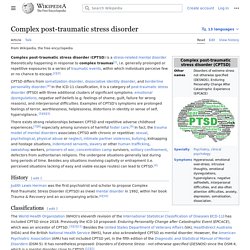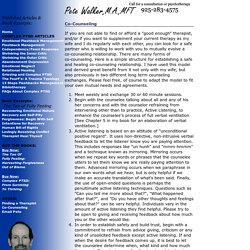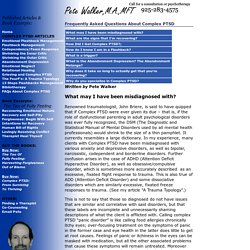

LE TRAUMA VICARIANT UN MAL POLICIER MAL CONNU - CGT-Intérieur IdF. Éléments biographiques: Marion Fareng, docteur en psychologie – spécialisée dans le psychotrauma depuis 10 ans et la prise en charge des victimes de violences.

Thèse sur l’efficacité de la prise en charge hypnothérapeutique dans les troubles psychotraumatiques. Formatrice auprès de psychologues, psychiatres et médecins dans la prise en charge du psychotrauma. Publications récentes : Fareng, M. (2017). Prise en charge d’un traumatisme complexe, In 15 situations cliniques en hypnothérapie, Bioy, A. Paris : Dunod. . « A retenir : » 1) Le trauma vicariant, définition : Il se définit comme « des changements profonds subis par le travailleur qui établit des rapports d’empathie avec les survivants de traumatismes et est exposé à leurs expériences ». 2) Les symptômes : 3) Les risques pour la santé et la qualité de vie des agents : 4) Comment prévenir l’apparition de ce trauma vicariant ?
Faite remonter votre niveau de mal être via ce formulaire anonyme. Complex post-traumatic stress disorder - Wikipedia. Psychological disorder C-PTSD has also been referred to as DESNOS or Disorders of Extreme Stress Not Otherwise Specified.[7] Some researchers believe that C-PTSD is distinct from, but similar to, PTSD, somatization disorder, dissociative identity disorder, and borderline personality disorder.[6] Its main distinctions are a distortion of the person's core identity and significant emotional dysregulation.[8] It was first described in 1992 by an American psychiatrist and scholar, Judith Herman in her book Trauma & Recovery and in an accompanying article.[6][9][10] The disorder is included in the World Health Organization's (WHO) eleventh revision of the International Statistical Classification of Diseases and Related Health Problems (ICD-11).

The C-PTSD criteria has not yet gone through the private approval board of the American Psychiatric Association (APA) for inclusion in the Diagnostic and Statistical Manual of Mental Disorders (DSM). Symptoms[edit] Children and adolescents[edit] Dr. Dr. Pete Walker, M.A. Psychotherapy. Published Articles & Book Excerpts: Home COMPLEX PTSD ARTICLES Emotional Flashback Management Flashback Management Codependency/Fawn Response Shrinking the Inner Critic Shrinking the Outer Critic Abandonment Depression Emotional Neglect Relational Healing Grieving and Complex PTSD The FourF's: A Trauma Typology 13 Steps Flashbacks Management Bibliotherapy FAQs About Complex PTSD Book Excerpts: The Tao of Fully Feeling Recovering Emotional Nature Recovery and Self-Pity Forgiveness: Begin With Self Intentions for Recovery Human Bill of Rights Lovingly Resolving Conflict Therapist Heal Thyself.

Complex PTSD: From Surviving to Thriving: A GUIDE AND MAP FOR RECOVERING FROM CHILDHOOD TRAUMA: Pete Walker: 8601420534247: Amazon.com: Books. Pete Walker, M.A. Psychotherapy. If you are not able to find or afford a "good enough" therapist, and/or if you want to supplement your current therapy as my wife and I do regularly with each other, you can look for a safe partner who is willing to work with you to mutually evolve a co-counseling relationship.

There are many forms of co-counseling. Here is a simple structure for establishing a safe and healing co-counseling relationship. I have used this model and derived great benefit from it not only with my wife, but also previously in two different long term counseling exchanges. Please feel free, of course to adapt the model to fit your own mutual needs and agreements. Meet weekly and exchange 30 or 60 minute sessions.Begin with the counselee talking about all and any of his her concerns and with the counselor refraining from intervening other than to practice, Active Listening, to enhance the counselee's process of full verbal ventilation [See Chapter 5 in my book for an elaboration of verbal ventilation.]
Complex PTSD: From Surviving to Thriving: A GUIDE AND MAP FOR RECOVERING FROM CHILDHOOD TRAUMA: Pete Walker: 8601420534247: Amazon.com: Books. Pete Walker, M.A. Psychotherapy. Written by Pete Walker What may I have been misdiagnosed with?

Renowned traumatologist, John Briere, is said to have quipped that if Complex PTSD were ever given its due – that is, if the role of dysfunctional parenting in adult psychological disorders was ever fully recognized, the DSM (The Diagnostic and Statistical Manual of Mental Disorders used by all mental health professionals) would shrink to the size of a thin pamphlet. It currently resembles a large dictionary. In my experience, many clients with Complex PTSD have been misdiagnosed with various anxiety and depressive disorders, as well as bipolar, narcissistic, codependent and borderline disorders.
Further confusion arises in the case of ADHD (Attention Deficit Hyperactive Disorder), as well as obsessive/compulsive disorder, which is sometimes more accurately described as an excessive, fixated flight response to trauma. What are the signs that I’m recovering? How Did I Get Complex PTSD? How do I know I am in a Flashback?